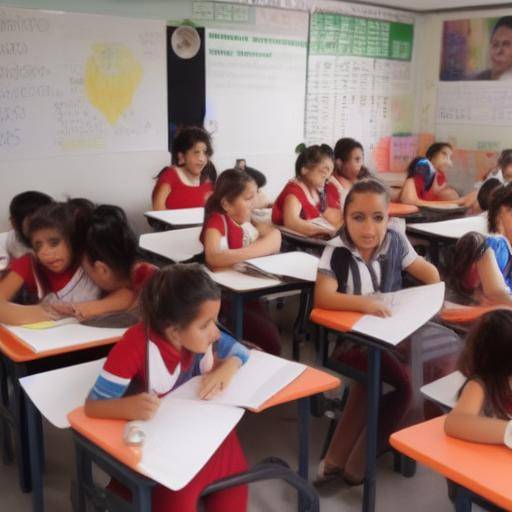
Introduction
Teaching children about long-term investment and savings is a growing issue in today ' s society. As we enter an increasingly complex economic environment, it is crucial for young people to acquire strong financial skills from an early age. In this article, we will explore effective strategies to educate children about the importance of long-term savings, investment and planning, providing tools to ensure their economic growth, financial security and future. Learning to invest and save from an early age can have a significant impact on adult life, providing children with a solid basis for achieving financial stability in the future.
History and Background
Financial education for children has become a crucial pillar in modern society. As the world experiences rapid economic and technological changes, it has become essential to inculcate healthy financial habits from an early age. Historically, investment and savings education has been relegated to adulthood, but in recent decades there has been a paradigm shift that recognizes the importance of providing children with the necessary tools to understand and manage their money from a younger age.
Importance of Financial Background
The absence of strong knowledge on investment and savings can limit opportunities for growth and financial stability throughout life. It is essential that children understand the basic concepts of investment and savings, as well as the long-term benefits of developing these skills. Financial education from an early age can make a difference in the ability of children to achieve significant financial goals in the future.
Deep analysis
Benefits of Early Financial Education
Teaching financial concepts from an early age provides children with the tools to make informed decisions about their money. This gives them the opportunity to ensure strong financial growth and lay the foundations for a prosperous economic future. In addition, early financial education can foster planning, decision-making and accountability skills that are critical in adult life.
Challenges and Opportunities
Despite the importance of financial education for children, there are significant challenges, such as the lack of formal educational programmes and the need to address financial concepts in an accessible and relevant way to their age. However, this situation also presents opportunities for the creation of innovative programmes and educational resources that effectively address these needs.
Comprehensive review
Practical Applications
Financial education for children can take various forms, from interactive games and activities to educational programmes in schools. By integrating financial concepts into the school curriculum and fostering experiential learning, children can be given a practical understanding of the importance of long-term savings and investment.
Opinions of Experts
According to experts in financial education, the integration of investment and savings concepts from an early age can have a significant impact on the ability of children to manage their money effectively in the future. This gives them the opportunity to build a more secure and stable financial future.
Comparative analysis
Parallel between Growth, Security and Future
The teaching of financial concepts to children is closely linked to their personal growth, offering them the opportunity to acquire skills that will benefit them throughout their lives. It also provides financial security by equipping them with the tools for making informed financial decisions and ensuring their economic well-being in the future.
Growth and Security Synergies
Understanding the relationship between savings, investment and financial security can provide children with a holistic perspective on their economic future, fostering a long-term planning mentality and the ability to face financial challenges with confidence and resilience.
Practical Tips and Accessible Tips
Fostering Experience Learning
Involving children into practical activities, such as managing a small amount of money through household chores or allowing them to make informed purchasing decisions, can be an effective way of teaching them about the value of money, the importance of savings and responsible financial decision-making.
Teaching to Plan Long Term
Taking advantage of opportunities to discuss long-term financial goals with children can help them understand the importance of financial planning and future vision. Setting goals and creating a plan to achieve them can give them a practical understanding of the importance of investment and long-term savings.
Industry Information and Expert Reviews
Perspectives for the Future
According to education and finance experts, the integration of financial concepts into children ' s education is essential to preparing them for the economic challenges of the future. These skills not only provide them with personal financial security, but also contribute to their ability to contribute positively to the economy in general.
Reflections on Trends
Current trends suggest a growing approach to the creation of innovative educational programmes that effectively address financial education for children, recognizing the importance of equating future generations with the financial skills necessary to ensure a stable economic future.
Case Studies and Real Life Applications
Examples of Success
Case studies that demonstrate the positive impact of early financial education on children ' s lives, highlighting concrete examples of how the understanding of investment and savings has resulted in significant financial growth and greater economic security over time.
Lessons Learned
In analysing actual cases of financial concepts in the life of children, valuable lessons can be drawn on effective strategies and approaches that have proven to be successful in the teaching of investment and long-term savings.
Future Trends and Predictions
Emerging Innovations
Technological advances and developments in the financial landscape suggest a growing approach to integrating digital and technological tools into financial education for children, providing new opportunities to teach financial concepts interactively and attractively.
Conclusion
Teaching children about long-term investment and savings is critical to ensuring their economic growth, financial security and future. By providing them with the necessary tools and knowledge to understand and manage their money, they are given the opportunity to develop solid financial skills from an early age, laying the foundations for a stable and prosperous economic future.
Frequently asked questions
Why is it important to teach about investing and saving children from early age?
Teaching children about investment and savings from an early age gives them the tools necessary to understand the importance of managing their money in a responsible way, establishing solid foundations for their financial growth throughout life.
What is the long-term impact of educating children about financial concepts?
Early financial education can have a significant impact on the ability of children to make informed financial decisions in the future, ensuring their financial security and economic well-being over time.
How can I teach children about investment and savings effectively?
To involve children in practical activities, discuss long-term financial goals and provide concrete examples of financial concepts in everyday life are effective strategies to teach them about investment and savings.
What are the long-term benefits of financial education for children?
Financial education for children gives them the opportunity to develop sound financial skills that will allow them to make informed decisions about their money throughout their lives, providing them with financial security and a more stable economic future.
How can I integrate financial concepts into the education of my children?
It is possible to integrate financial concepts into children ' s education through practical activities, discussions on the value of money and financial responsibility, and the establishment of long-term savings and planning targets.
What is the role of technology in financial education for children?
Technology can play a crucial role in providing interactive tools and digital educational resources that make financial education more accessible and attractive to children, facilitating their understanding of financial concepts.
When is the best time to start teaching children about investment and savings?
It is beneficial to start teaching children about investment and savings from an early age, taking advantage of opportunities to integrate financial concepts on a daily basis and foster a practical understanding of the value of money and long-term planning.
What is the social impact of financial education for children?
Financial education for children not only benefits at the individual level, but also contributes to the formation of a future generation more informed and able to make responsible financial decisions, which can have a positive impact on society as a whole.
In short, teaching children about long-term investment and savings is crucial for their financial development and future economic well-being. By providing them with a sound basis of financial knowledge and fostering healthy financial habits from an early age, they are given the opportunity to ensure their growth, security and economic future.






















































